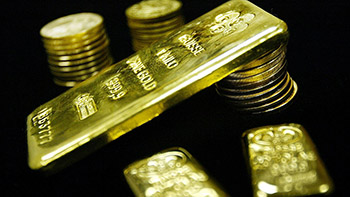
China has curbed gold imports in the wake of government attempts to clamp down on capital leaving the country, according to traders and bankers.
交易员和银行家表示,中国政府为抑制资本流向国外,对黄金进口做出了限制。
Some banks with licences have recently had difficulty obtaining approval to import gold, they said — a move tied to China’s attempts to stop a weakening renminbi by tightening outflows of dollars, the banks added.
他们表示,最近一些拥有许可证的银行很难获批进口黄金。有些银行补充称,此举与中国试图通过收紧美元外流来阻止人民币走弱的努力有关。
The hit to gold imports comes as China tightens restrictions on overseas deals by state-owned companies in an effort to limit capital outflows that has seen the renminbi fall to its lowest against the dollar in eight years.
黄金进口受限的同时,中国政府也收紧了对国企海外交易的限制,这是为了抑制资本外流。资本外流已使人民币兑美元汇率下跌至八年来最低点。
The renminbi has slipped 5.8 per cent against the greenback this year, on track for its worst year on record.
今年人民币兑美元汇率下跌了5.8%,创下历史上行情最糟糕的一年。
Quotas for importing gold have been cut during quarterly assessments this year. Banks also have dollar quotas, some of which must be used when buying gold.
在今年的季度评估中,用于进口黄金的配额被降低。银行也拥有美元配额,在购买黄金时必须使用部分份额。
The limits on imports bite as the weakening renminbi raises Chinese investors’ interest in gold. Lower gold prices have also triggered more buying.
黄金进口受限让人感到愤怒,因为人民币走软提高了中国投资者对黄金的兴趣。较低的黄金价格也引发了更多买入。
The combination of tighter quotas and an uptick in demand caused the premium for gold in China over the international gold price to jump as high as $46 in the past few weeks, according to data from Wind Information. Normal levels are about $2 to $4.
万得资讯(Wind Information)的数据显示,在过去几周,配额收紧加上需求上升,导致中国金价较国际金价高出多达46美元。正常溢价水平约为2到4美元。
In an effort to ease that premium, Chinese banks have been allowed to import gold under their quotas using the offshore renminbi, one banker said. Although still high, the premium for gold on the Shanghai Gold Exchange has since fallen to $26, according to Wind data.
一位银行家表示,为了降低溢价,中国的银行被允许在配额内使用离岸人民币进口黄金。万得资讯的数据显示,尽管溢价仍很高,但上海黄金交易所(SGE)的黄金溢价已跌至26美元。
The People’s Bank of China did not immediately respond to a request for comment.
中国央行(PBoC)没有立即回复记者的置评请求。
If the restrictions on imports are sustained that could raise questions about China’s moves to open its gold market to international traders. The world’s largest consumer of the precious metal has moved to have a greater voice over the price of gold.
如果黄金进口限制持续下去,这可能使中国向国际贸易商开放黄金市场的行动遭到质疑。作为世界上最大的黄金消费国,中国已逐渐对金价有了更大的发言权。
China imported about 905 tonnes of gold in the first nine months of this year, according to export data from Hong Kong, Switzerland, Australia and the UK, the main traditional sources. Much of that is normally re-exported as jewellery.
来自香港、瑞士、澳大利亚和英国的出口数据显示,今年前9个月,中国黄金进口量约为905吨。其中,大部分黄金通常以珠宝形式再出口。
In 2013, China awarded three foreign banks — HSBC, Standard Chartered and ANZ — licences to import gold, which it controls via the quarterly quota system. A year later, the PBoC allowed the Shanghai Gold Exchange to set up an international board to open the market to foreign investors.
2013年,中国向三家外资银行——汇丰银行(HSBC)、渣打银行(Standard Chartered)和澳新银行(ANZ)授予了黄金进口许可证。中国通过季度配额制度对黄金进口实行控制。一年后,中国央行批准上海金交所设立国际板,向外国投资者开放了市场。
This year the SGE also launched a daily gold-pricing auction, similar to the process run in London between banks. In October ANZ started to participate in benchmark auction.
今年,上海金交所还推出了上海金集中定价合约——类似于伦敦在银行之间的黄金定价方法。10月份,澳新银行开始参与基准价定价。
“It’s like one step forward and three steps backwards,” one international banker said about the import restrictions.
“这就像前进一步,倒退三步,”一位国际银行家在谈到黄金进口限制时表示。
China already restricts exports of gold, which means local prices can trade at a discount to global ones, further limiting the integration of its market with the rest of the world.
中国已对黄金出口设限——意味着国内金价可能低于全球金价——进一步限制了本国市场与世界其他地区市场之间的融合。












